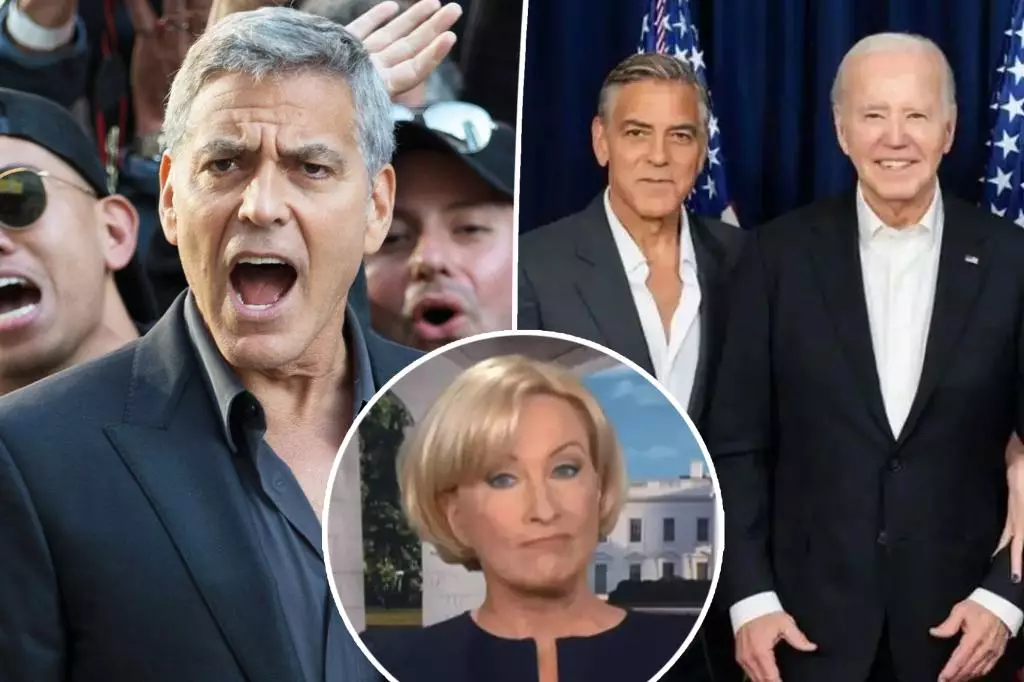In an era where the lines between celebrity culture and political discourse are increasingly blurred, the latest dust-up involving George Clooney sheds light on the interpersonal dynamics at play within media and Hollywood. This feud, centered around a controversial comment made by Mika Brzezinski on the “Morning Joe” show, reveals much about the pressures that prominent figures face when their public statements become entangled with political implications. The alleged outrage expressed by Clooney underscores not only his passionate commitment to his ideas but also highlights a deeper rift regarding accountability and responsibility in media narratives.
Op-Eds and Allegations: The Inciting Incident
Clooney’s discontent stemmed from a suggestion made by Brzezinski that former President Barack Obama was somehow behind his New York Times op-ed advocating for Joe Biden to withdraw from the 2024 presidential race. This assertion, which came from a figure not known for mincing words, undoubtedly ignited a firestorm. The actor, known for his significant contributions to both film and humanitarian efforts, was said to react vehemently to the insinuation that he was a puppet of presidential influence. Such a portrayal not only undermines Clooney’s agency but also distorts the message he was attempting to convey.
In times where celebrity voices resonate loudly in political discussions, it is critical for media personalities to tread carefully. Bafflingly, Brzezinski’s remarks, which deemphasized Clooney’s autonomy, seemed to overlook the ongoing conversation about the importance of immense public outrage regarding crucial political issues. It’s intriguing to contemplate why discussions of this nature are often more sensationalized than the issues at stake.
Clooney’s Emotional Response: A Call for Solidarity
According to author Chris Whipple’s account in *Uncharted: How Trump Beat Biden, Harris and the Odds in the Wildest Campaign in History*, Clooney reportedly blasted an MSNBC producer in a fiery phone call, demanding a defense of his integrity. His emotional response signifies not only the personal stakes he has in the matter but the broader implications for public figures who engage in political dialogue. Clooney’s words, casting both anger and disappointment toward the producer for their perceived lack of loyalty, underlined a longing for solidarity in a space where criticism can feel more stinging than ever.
The exchange, filled with heated language, reflects a man feeling betrayed by the media ecosystem he has engaged with. Clooney felt the sting of betrayal not just as an artist but as a citizen advocating for the political discourse that shapes society. This moment exemplifies the emotional turmoil that can result when public figures feel that their views or intentions are misconstrued.
The Role of Media in Shaping Narratives
Mika Brzezinski’s comments reveal the risks journalists face in expressing opinions during politically charged conversations. Often, their personal biases can inadvertently dictate public perception. The incident serves as a reminder that media personalities have a considerable responsibility to ensure that their commentary doesn’t misrepresent individuals or their stances.
Tara Palmeri’s recounting of the interaction indicates that even behind-the-scenes media interactions are volatile and can escalate quickly. While the infighting between Clooney and the MSNBC staffer illustrates the tension that can arise, it also emphasizes the crucial role of media producers in navigating complicated narratives. The challenge is significant: managing the expectations of powerful actors while maintaining the editorial independence that journalism depends upon.
Cultural Reflections in Political Speech
This event reflects a troubling trend within contemporary society: the conflation of celebrity influence and political dialogue can lead to misunderstandings that generate far more heat than light. Celebrities like Clooney often use their platforms to challenge the status quo, yet when their authenticity is questioned, the fallout can be explosive. The implications of such scrutiny reach beyond calculated public relations moves; they speak to the heart of what it means to engage meaningfully in political discourse.
As more celebrities enter political conversations, the need for thoughtful, respectful engagement grows. Brzezinski’s statements provide fodder for critique, yet they also signal the increasing pressures on public figures to navigate both media and politics proficiently. Clooney’s furious response is a symptom of broader frustrations in a landscape where distinctions between fact and opinion frequently become muddled. In this charged atmosphere, it’s critical for counterparts in media to uphold integrity, fostering genuinely informed discussions rather than sensationalized character attacks.

Leave a Reply